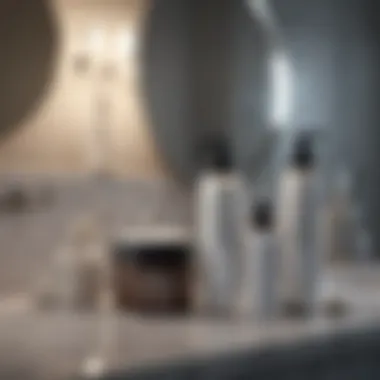Effective Strategies for Treating and Preventing Dandruff


Intro
Dandruff is more than a simple annoyance. It is a nuance that affects a significant portion of the population. Engaging in our daily lives often punctuated by moments of discomfort from embarrassing flakes can be tiring. Understanding the origins, treatments, and prevention methods for dandruff becomes paramount.
This article objecively delves into the strategies to tackle this common scalp condition, providing you with a broad toolkit of both therapeutic approaches and lifestyle amendments.
Understanding Dandruff's Causes
Dandruff often stems from a range of factors, including but not limited to dry skin, seborrheic dermatitis, and fungal infections like Malassezia. Hormonal changes, stress, and even dietary deficiencies can predispose individuals to excessive flaking. They act in regulation of the skin microflora, ultimately influencing the condition of the scalp.
Targeting the Fungal Aspect
Malassezia yeast thrives on scalp oils, leading to inflammation and flaking for some. With that in mind, the use of antifungal shampoos can be beneficial. Active ingredients such as ketoconazole and zinc pyrithione specialized for combating such fungal conditions are recommended. Regular use can reduce scaling and irritation, creating a healthier scalp environment.
Effective Treatment Options
Dealing with dandruff begins with selecting the right treatment based on the underlying cause. It's prudent to explore several options before settling on the most effective regimen tailored to the individual.
Over-the-Counter Solutions
Many available options include:
- Shampoos containing salicylic acid: It aids in removing flakes.
- Tar-based shampoos: Slow down the production of skin cells.
- Selenium sulfide products: Reduce Malassezia and relieve itching.
- Tea tree oil uses: Natural antifungal properties can soothe the skin.
Choosing a proper dosage is crucial for system effectiveness, and the user should incorporate them regularly as dictated on packaging.
Prevention Through Lifestyle Adjustments
Certain simple changes to one’s daily routine can foster a healthier scalp and thus immobilize the conditions that trigger dandruff.
- Maintain good scalp hygiene by cleansing regularly may help control oily hair
- Reduce stressors through guided techniques such as yoga or meditation.
- A balanced diet, including omega-3 fatty acids, can enhance skin and hair health.
The integration and stability of these lifestyle adjustments play a significant role in maintaining a flake-free appearance.
End
The journey towards managing dandruff necessitates a multi-pronged approach. Education about the causes, initiation of suitable treatments, and prevention intends to enrich scalp conditions. This discourse endeavors to impart useful information and disseminate actionable advice to manage and get ot rid of many common types which causes discomfort.
Knowledge equips us with choices, leading to healthier scalp management.
Understanding Dandruff
Understanding dandruff is fundamental for anyone seeking to effectively address and manage this common concern. As a multifaceted scalp condition, dandruff can stem from a variety of underlying factors. Knowledge of these aspects not only helps in controlling the symptoms it presents but also facilitates a deeper awareness of one’s scalp health.
Recognizing the significance of dandruff goes beyond merely addressing the flakes themselves. It is about embracing the health of the scalp as a part of one's overall physical appearance. Taking time to understand dandruff allows individuals to explore appropriate treatment avenues and preventative measures.
What is Dandruff?
Dandruff refers to the unsightly white or yellowish flakes that appear on the scalp and hair. This condition affects many people regardless of age or gender. While dandruff is not a medically serious condition, it can have social and psychological repercussions.
The Causes of Dandruff
Understanding the various causes of dandruff is crucial in strategies for treatment and prevention.
Dry Skin
Dry skin is one of the most prevalent contributors to dandruff. The condition arises when the scalp lacks moisture. Dryness is often exacerbated by environmental conditions such as cold weather or low humidity levels. Characteristically, dry skin leads to fine flakes. It is important to underscore that while it’s common, dry skin can also be accompanied by itchiness.
This component has an impressive relevance in the text, as it reminds readers that scalp health can vary depending on external conditions. The unique challenge of addressing dry skin is balancing hydrating treatments and not aggravating the existing problem with harsh chemicals.
Seborrheic Dermatitis
Seborrheic dermatitis is another primary cause of dandruff. This condition manifests as red, greasy patches covered with white or yellow scales. Individuals with seborrheic dermatitis may notice symptoms not just on their scalp, but also on other oily areas of the body. The significant characteristic to keep in mind is its contribution to an oily scalp, which could seem contradictory to the perception of dandruff.
The inclusion of seborrheic dermatitis is essential. It serves as a reminder that dandruff treatments must be approached with a comprehensive understanding of how various skin conditions interact with one another. This condition can lead to discomfort and requires tailored treatment plans.


Fungal Infections
Fungal infections also pay a substantial role in dandruff’s presence. Malassezia is a fungus that naturally resides on the scalp yet can cause irritation in certain cases. It leads to scaliness when present in excess. The critical aspect of fungal infections as a cause of dandruff lies in their potential to trigger a heightened immune response in some individuals. Understanding the impact of this fungus is key, as neglected cases could lead to persistent scalp issues and prompt the necessity of antifungal treatments.
Skin Conditions
Finally, other skin conditions such as psoriasis or eczema can provoke dandruff-like symptoms. These conditions might trigger inflammation or an outgrowth of skin cells, leading them to shed excessively. Awareness of skin conditions is beneficial in the process, guiding the treatment strategy by addressing underlining causes rather than merely alleviating the dandruff symptoms.
The mention of skin conditions enriches the overall discussion. It reminds the readers that simplicity should not be taken for granted regarding scalp health and ensures that proper medical consultation is advised anything persists.
Common Myths about Dandruff
Dandruff is steeped in common myths which often lead to misunderstanding a widespread condition. It is not a result of poor hygiene as presumed by some. Regularly washing hair contributes positively to thanking oily residues but is not a sole precaution.
There is also an ingrain belief that dandruff only occurs only due to dry scalp. The causing conditions tend to be interwoven, misinforming everyday treatment paths. Hopeful perspectives rest in correctly aligning knowledge with proactive care essential in overcoming these preconceptions.
To sum up, addressing the root causes and clarifying misconceptions about dandruff sets a strong foundation for later treatment discussions and strategies for prevention.
Diagnostic Approach
Understanding when and how to approach a diagnosis for dandruff is crucial. This section discusses significant factors related to the diagnostics aspect of dandruff, its common signs, and the benefits of consulting a professional.
When to Consult a Dermatologist
Dandruff can often be managed with simple over-the-counter treatments. However, there are times when consulting a dermatologist is warranted. If you notice the following signs, it’s time to seek professional help:
- Persistent flaking despite home treatments
- Severe itching or discomfort on the scalp
- Redness or inflammation on the scalp where the flakes appear
- Change in hair texture or unusual hair loss
- Symptoms spreading off the scalp to other areas of the body
A dermatologist can assess the scalp condition more accurately. They can distinguish between types of dandruff and pinpoint any underlying causes, which is essential when considering effective treatment plans.
What to Expect During Your Appointment
When you visit a dermatologist regarding dandruff, there are specific aspects that you should expect. The appointment usually involves a comprehensive assessment of your scalp and skin such as:
- Detailed Interview - Be ready to share your medical history, including previous skin conditions, treatments you have sought, and any known allergies.
- Physical Examination - The dermatologist will likely perform a thorough examination of your scalp, looking closely at flaking patterns or signs of inflammation.
- Possible Tests - In some cases, the professional may suggest skin scrapings or scalp biopsies to rule out other conditions like psoriasis or fungal infections.
- Discussing Lifestyle - The dermatologist might inquire about your daily habits—this includes shampoo frequency, hair products, diet, and stress levels as they relate to your hair and scalp health.
Overall, this collaborative approach ensures that you walk away from the appointment with a more defined path to better manage or treat your dandruff effectively, understanding if simple changes in your regime might also improve your condition.
This collaboration fosters a tailored treatment strategy that addresses the specific needs of your scalp.
Treatment Options
The topic of treatment options is fundamental for managing dandruff effectively. Understanding this section equips readers with a range of viable solutions tailored to their unique needs. It is essential to address not only the symptoms but also the underlying causes that contribute to this common scalp condition. Each treatment type offers distinct benefits, and choosing the right strategy can lead to substantial improvement in scalp health and overall quality of life.
Over-the-Counter Treatments
Over-the-counter treatments are often the first line of defense in managing dandruff. These products provide convenient access to solutions without the need for prescription medication. Common selections among these treatments include anti-fungal shampoos, Ketoconazole shampoos, and Salicylic acid shampoos. Each type stands out for specific reasons and caters to different aspects of dandruff control.
Anti-fungal Shampoos
Anti-fungal shampoos target the yeast-like fungus that commonly aggravates dandruff. The significant characteristic of these shampoos is their active ingredients, such as zinc pyrithione, which help reduce fungus levels and prevent severe outbreaks. Their broad availability makes them a popular choice for many individuals combating dandruff.
The primary benefit of anti-fungal shampoos is their effectiveness in soothing scalp irritation and preventing flaking. They may lack rigor in addressing underlying skin issues, but regular use often yields viable results for mild to moderate dandruff sufferers. It is wise to check the labels to find formulations best suitable for individual hair types.
Ketoconazole Shampoos
Ketoconazole shampoos are uniquely formulated to have a stronger effect against fungal infections. Commonly recommended by dermatologists, they contain the active ingredient Ketoconazole, which effectively combats the Malassezia fungus associated with seborrheic dermatitis.
A key characteristic of this option is its dual action – not only does it target fungus, but it also reduces inflammation. However, some users may experience dryness or irritation with prolonged use. It often proves beneficial for persistent cases, promoting a visibly healthier scalp over time.
Salicylic Acid Shampoos
Salicylic acid shampoos offer a different approach by facilitating the removal of dead skin cells from the scalp. This unique exfoliating property reduces flaking and builds-up, a common issue for those suffering from dandruff. Those prone to oily scalp might find significant relief with this formulation.
Salicylic acid shampoos may take time to show effects; continuous use is necessary to yield the desired benefits. An advantage is often smooth, well-conditioned hair following treatment due to the added moisture these products offer.
Prescription Treatments


When over-the-counter options fail, healthcare professionals may recommend prescription treatments. These involve higher-potency formulations and often target persistent, severe dandruff. The two primary types within this bracket include topical corticosteroids and other prescription options.
Topical Corticosteroids
Topical corticosteroids are essential for severe dandruff that results in significant inflammation or redness. They reduce irritation and inflammation drastically due to their active suppressive nature.
Their key characteristic focuses on reducing the immune response; thus, they are advantageous for persistent conditions. However, caution is needed, as long-term use can lead to side effects like thinning skin. Consultation with a healthcare provider becomes imperative for sustained use.
Other Prescription Options
Other prescription options can vary from medicated shampoos to treatments containing coal tar. Choices here will depend on the individual's specific needs and the underlying causes contributing to dandruff. Coal tar, for instance, sometimes proves effective in lowering the scalp's turnover rate of cells, thereby reducing flakes.
Such prescription treatments may offer a more tailored approach that, although not initially preferred, serves significant improvement for persistent cases. Continued evaluations can enhance results down the road.
Home Remedies
Home remedies represent a natural approach for dealing with dandruff. Often, individuals gravitate towards these options for their accessibility and perceived safety. Our discussions here cover Coconut oil, Aloe Vera, and Apple Cider Vinegar, each contributing positively to dandruff management.
Coconut Oil
Utilizing coconut oil provides excellent moisturizing dread that can mitigate dryness and flakiness. Its primary robust characteristic is lauric acid, offering antimicrobial properties effective against potential scalp irritation. Coconut oil's benefit lies in its easy application and replication at home, promoting easy integration into regular hair care routines.
However, care should be taken with oily buildup, especially for those with oily hair types. Finding balance in usage is necessary to experience maximum benefits without overwhelming the scalp.
Aloe Vera
Aloe Vera is renowned for its soothing properties, making it an excellent contender in combating dandruff. Its unique feature lies in its gel formulation that hydrates the scalp, potentially reducing itchiness and irritation. Those experiencing acute symptoms amidst the underlying conditions may explore those benefits.
One minor disadvantage is the need for longer application periods for noticeable results. Its application is generally safe, yet mixing with other treatments may provide broader results for recalcitrant cases.
Apple Cider Vinegar
Apple cider vinegar may assist in balancing the scalp's pH levels while possessing antifungal properties. Its essence is notable in promoting a cleaner scalp, preventing buildup that facilitates dandruff. This natural healer stands out for consistency with home practices, typically requiring dilution for safe usage.
Despite the multiple benefits, some may find the smell overpowering, presenting a minor inconvenience. Regular use can vastly improve scalp conditions, making it a superior, accessible alternative for proactive dandruff prevention.
Dandruff management remains a persistent challenge. Combining different treatments could achieve the best results effectively.
Preventative Measures
Preventative measures are critical in managing dandruff effectively. While various treatments can address existing flakes, taking proactive steps can prevent their occurrence in the first place. The balance between using suitable products, maintaining overall health, and managing environmental factors plays a significant role. By implementing consistent care practices, individuals can reduce flare-ups and maintain a healthier scalp.
Regular Scalp and Hair Care
Maintaining a routine for scalp and hair care cannot be understated. It includes thoroughly cleansing the scalp to remove sebum and dead skin. Regularly washing your hair, about two to three times a week, ensures that product buildup and dirt do not accumulate.
- Use mild shampoos. Avoid harsh chemicals that can irritate and dry the scalp. Look for labels that specify sulfate-free or designed for sensitive skin.
- Massage the scalp gently. This increases blood circulation and rejuvenates hair follicles. Massaging can help to distribute natural oils uniformly across the scalp.
- Do not skip conditioner. Focus on the ends of your hair to avoid overly burdening the scalp. A good conditioner can hydrate the hair.
These steps collectively minimize the factors that contribute to dandruff. Establishing a routine can bring long-term benefits.
Diet and Nutrition
Diet greatly influences skin and scalp health. An unbalanced diet can exacerbate dandruff. Here are key aspects to consider:
- Hydration. Drink plenty of water to stay hydrated. When the body is hydrated, it reflects in skin health.
- Essential nutrients. Incorporate food rich in omega-3 fatty acids, vitamins A and D, and zinc. These nutrients are crucial for skin moisture and overall scalp condition. For example, avocados, fish, nuts, and leafy greens provide many of these essentials.
- Limit processed foods. Foods high in sugar and fat can lead to inflammation, affecting skin conditions.
This approach to nutrition helps support not only so scal health but overall wellbeing. Healthy eating habits set a foundation for skin resilience against flake formation.
Stress Management Strategies
Stress serves as a significant trigger for many skin issues, including dandruff. Managing stress effectively is essential for keeping your scalp healthy. Here are strategies that might help:
- Practice mindfulness and meditation. Taking time to focus on breathing can significantly reduce anxiety levels.
- Engage in physical activities. Regular exercise boosts endorphin production, improving overall mood.
- Prioritize sleep. Quality rest helps in skin recovery and general health. Establish a calming evening routine to wind down effectively.
By keeping stress in check, you can greatly reduce its impact on dandruff. These strategies contribute positively to overall health and enhance dermatologist-approved treatments.


Consistency in these daily practices is key. Small lifestyle adjustments can effectively contribute to keeping dandruff at bay.
Lifestyle Adjustments
Lifestyle adjustments play a crucial role in managing and preventing dandruff. The choices we make daily about our hair and scalp care not only impact our immediate comfort but also contribute to long-term scalp health. Regular, informed lifestyle decisions can help unravel the complex issues associated with dandruff, leading to a more balanced scalp environment.
Choosing the Right Hair Products
Selecting appropriate hair products is essential in maintaining a dandruff-free scalp. Ingredients matter significantly. Look for gentle, pH-balanced shampoos and conditioners that do not strip the scalp of its natural oils. Products that contain zinc pyrithione or salicylic acid can aid in controlling excess oil and reducing flakiness.
- Each individual is unique, and hair condition varies widely. Test various products to identify things that work best for your hair type.
- When possible, avoid harsh sulfates or dyes, as these can exacerbate existing conditions.
- Don’t be afraid to consult with a professional for tailored product recommendations that consider your specific needs.
Keeping Scalp Healthy
Maintaining a healthy scalp is a cornerstone of dandruff prevention. This includes establishing a solid routine that incorporates effective cleaning and conditioning:
- Regular Washing: Shampoo your hair regularly, which helps to remove buildup and excess oils. Enough frequency can almost vary greatly depending on individual scalp conditions.
- Exfoliation: Occasionally exfoliate the scalp to regenerate skin cells. Consider use of gentle scrubs or brushes designed for the scalp during showering.
- Moisturization: Apply a light oil or specialized scalp lotion to combat dryness after showering.
By addressing the components that contribute to an unhealthy scalp, you can improve symptoms dramatically.
Avoiding Triggers
Understanding and avoiding personal triggers is partially psychological and partially environmental. Various factors can contribute to dandruff flare-ups:
- Diet: Evaluate what you eat. Leading a balanced diet rich in mythanol-providing foods may keep skin more resilient.
- Stress: Emotional stress can lead to increased dandruff. Engaging in relaxation técnicas might mitigate this chemistry.
- Climate: Sometimes, environmental conditions like low humidity during winter can contribute. Trying scalp oils or humidifiers could melliorate this on a need bases.
A deeper understanding of these aspects combined with strategic planning can alleviate or even prevent dandruff difficulties altogether.
Embracing lifestyle modifications crafting individualized attention to your own hair care routine ensures long-term management of dandruff, whilst also improving overall scalp warriorship.
Emotional Impact of Dandruff
Dandruff is more than just a cosmetic issue; it often carries significant emotional weight. Many individuals with dandruff experience anxiety, self-consciousness, and low self-esteem. These feelings can be exacerbated by the visible nature of dandruff and the associated social stigma. It is essential to acknowledge and address the emotional impact that dandruff can have on one's life, as mental well-being is closely tied to physical health.
One of the primary emotional challenges people face is the fear of judgment. This fear can lead to avoidance of social gatherings or activities where one's scalp is likely to be exposed. It may result in a reduced quality of life, affecting personal and professional relationships. Understanding the psychological burden of dandruff can be the first step towards addressing and managing its effects.
Understanding Social Stigma
Social stigma surrounding dandruff can be deeply rooted in misconceptions. Many see it as a sign of poor hygiene, which can induce feelings of shame for those suffering. This perception makes individuals feel isolated and discouraged. In a world that often prioritizes exterior appearances, battles with dandruff can lead to unjustified social ostracism.
People may experience bullying or negative comments, especially in younger demographics. This can have profound effects on mental health, including increases in anxiety and depression. Educating others about the true nature of dandruff can gradually dismantle these stigmas, allowing those affected to communicate better about their experiences without fear of reprisals.
Building Confidence
Overcoming the emotional distress caused by dandruff is necessary for reclaiming personal confidence. Education about treatment options is a valuable tool. When individuals discover effective strategies to manage their dandruff, they often gain a sense of empowerment. Being proactive about hair and scalp care can transfer to increased confidence in social situations.
Additionally, developing better self-image and acceptance is important. Some simple strategies can enhance self-esteem:
- Focus on Overall Grooming: Keeping the hair well-groomed and neat can draw attention away from further irritation or flakes.
- Embrace What You Can Control: Wearing flattering clothes, a clean appearance, and adopting positive body language can shift focus from the condition.
- Connect with Support Groups: Online forums and support groups can provide a comforting space to share experiences, understanding that others deal with similar issues can help instill confidence.
Understanding that dandruff can affect anyone at any age allows for a more inclusive environment that fosters support and empathy among peers.
Final Thoughts
Dandruff is not just a superficial issue. It can significantly affect one's self-esteem and quality of life. Various factors contribute to this condition, influencing how it presents and how to treat it effectively.
Long-term management of dandruff is crucial. Being aware of the specific elements that influence dandruff can provide a solid framework. Regular assessment of scalp health and adapting to changes in one’s body is demanding but highly beneficial.
In addition, prevention plays a significant role. Simple daily practices, like monitoring diet and identifying personal triggers, can decrease the periods of exacerbation. A dedicated approach toward maintaining a healthy scalp maximizes the standard effectiveness of chosen remedies and minimizes discomfort.
Long-term Management of Dandruff
Managing dandruff over the long term often entails several strategies. First, individuals should introduce a tailored hair care regimen incorporating appropriate products. These could include anti-fungal shampoos and mild hair cleansers to avoid irritation.
Moreover, regular lifestyle reviews are important. Notice how stress can translate on scalp. Methods could involve relaxation techniques or exercise. Integrating greater health habits supports resilience against dandruff outbursts. Most importantly, detangling underlying issues can sometimes help resolve hidden inflammation causing increased flaking during flare-ups.
The Importance of Consistency
Consistency cannot be underestimated in managing dandruff. Adherence to a routine—whether it relates to using specific products or maintaining general health practices—fuels better outcomes. Just as habits form over time, so do improvements in scalp and hair health. Without regular effort, progress is often thwarted.
Furthermore, results from dandruff treatments can take a few weeks to manifest. Continuous use of treatments leads to more solid scalp maintenance over time. Accept the fact that scalp health is not an overnight outcome; steady attention yields the best results. This is how one makes dandruff less of a recurrent issue and more of a manageable one.
In summary, embracing a holistic and ongoing strategy for treating and preventing dandruff can significantly impact life quality. Higher awareness of the condition enables individuals to actively prepare for healthy scalp maintenance.















